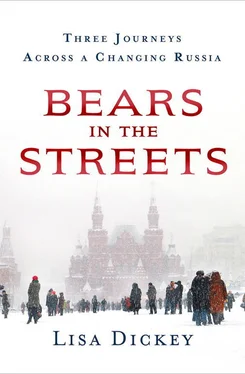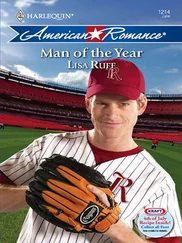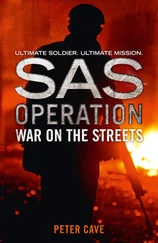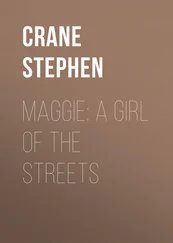To my surprise, the customer service rep told me that under my existing cell phone plan, I could text, FaceTime, and use unlimited Internet data throughout Russia—no Wi-Fi needed. The only service that would cost extra was making and receiving cell phone calls, which would be charged at ten cents a minute. I couldn’t believe my luck; how could all these international services be essentially free? Was there a catch? I asked the rep what their coverage was like in Russia, assuming that it must be pretty spotty to justify such a deal. “Hold on,” she said, “I’ll look at our map.”
“Ah,” she said after a moment. “Yeah, it’s not great. There are whole big parts of Russia with no coverage at all.”
Well, damn . “Can you tell me where, in general?” I asked. She gave me the URL so I could see the map for myself, and when I pulled up the image, I burst out laughing. Most of Russia wasn’t covered, all right—because most of Russia is covered in permafrost, and nobody lives there. There was, however, a band of coverage all along the populated, southerly route of the Trans-Siberian, exactly where I’d be traveling. “I think I’m good,” I told the woman. “Thanks.”
As long as I was poking around online, I decided to check out places to stay in Vladivostok. The first two times there, we’d stayed in private homes—in 1995 with an American friend of a friend, and in 2005 with a Russian journalist who plied us with vodka and charged us a couple hundred dollars for our weeklong stay. This time around I decided to just book a hotel, as I knew I’d be suffering from terrible jetlag and would sleep better if I had some privacy. Besides, the ruble was weak, and I was 48 years old now, so screw the foldout couch.
Before, arranging places to stay was one of the most time-consuming and stressful parts of the trip. Now, I actually giggled as I logged on to TripAdvisor to check out hotels. How about… the Vlad Motor Inn for $97 a night, or the Versailles Hotel, $119 a night, or maybe the more modest Hotel Teplo, $38 a night? I checked Google Maps to see where these hotels were located. And then I decided to mosey over to Airbnb, where I found a one-bedroom “sea & bridge view” for $42 a night, or a “cozy flat in the heart of Vladivostok” for $57 a night. I ended up booking a week at the Hotel Teplo, which didn’t even require prepayment, and the confirmation appeared almost instantly in my in-box.
At last, I felt pretty much set. I had my gear, my hotel reservation, and my one-way Aeroflot ticket to Vladivostok. Now I just needed my visa.
On August 5, I got it. For all my fretting, the Russian consulate never asked any questions at all, and in fact they processed the visa more quickly than expected. Maybe I’d been unnecessarily paranoid, and there wasn’t so much anti-American bias after all. For the first night in a while, I slept well, relieved that everything seemed to be going smoothly.
The next morning, I woke up to news of the Great Fromagicide.
The Russian government had publicly bulldozed or burned tons of imported food, primarily cheese, but also fruits, vegetables, and meat, that had been smuggled into the country in violation of its ban on Western agricultural products—a ban that was instituted a year earlier as a retaliatory slap to the countries that had imposed sanctions on Russia. Russian TV aired clips showing heavy machinery shoving mounds of Parmesan, Gouda, and other delicacies into dirty graves, while news anchors offered updates on such colorful developments as “an operation to liquidate dozens of tons of contraband pork,” and the fact that “Dutch flowers will be examined with a microscope at the border.”
It all felt rather silly, except that destroying tons of food during a severe economic downturn, especially in a country that had known too well the specter of hunger in its history, was serious business. By the end of the day, 200,000 people had signed an online petition asking the Russian government to stop the destruction. But as the Guardian reported, “Putin’s spokesman, Dmitry Peskov, said the president had signed the law, and that meant discussion was over on the topic for now.”
What the hell is going on in Russia? I thought. I couldn’t wait to get back and find out.
TWO
Vladivostok: The Lighthouse Keepers
On September 5, 1995, Gary and I wandered to a small clapboard house at the edge of Tokarevsky Cape, hoping to learn about the stark white lighthouse that stood nearby.
We had traveled an exceedingly long way to get here. From St. Petersburg, we’d flown to Vladivostok, 4,000 air miles, two herring-salad airplane meals, and seven time zones to the east. Then we took a taxi south of the city, to the top of a steep hill overlooking the windswept cape. The paved road ended, so we got out and hiked 20 minutes down a bumpy dirt road toward the water. Standing at the wooden picket fence outside the little house, we were less than 100 miles from the border of North Korea, and even closer to China. The only people we could see were a couple of old salts in the distance, fishing in tiny rubber dinghies; apart from those guys, we might as well have been standing alone at the edge of the earth.
Then we saw a third person, a man painting a shed just inside the wooden fence. “Excuse me,” I called out in Russian, and he looked up, set down his paintbrush and ambled over. He was scarecrow thin, with the leathery skin and perpetual squint of a man who spends many hours outdoors. Without a word, he unlatched the gate and waved us in, as if he’d been expecting us.
“Hello!” I said brightly. “We’re journalists from America! We’re hoping to learn about the lighthouse.”
“It was built in 1910,” said the man, unsmiling and without preamble. “My father began running it in 1954, when I was ten years old. My brother and I grew up here, and now we run it like my father did.” He told us his name was Vasily, and that he’d raised his own children here with his wife, Valentina. “Come meet her,” he said, and abruptly turned to walk toward the house.
The yard was massive, with multiple wooden structures and a spectacular view of the bay and the lighthouse in the distance. It was a sunny September day, and as we walked across the grassy expanse I took deep breaths of the warm, salt-tinged air. We followed Vasily to the house, clomping up a small set of steps leading to a doorway hung with a lace curtain.
“Mother! We have guests!” he barked, and a petite brunette with wide cheekbones and dark eyes—clearly his wife, not his mother—peered out from the kitchen. She looked confused, then wary, as she instantly perceived by our clothes and goofy grins that we weren’t Russians.
Upon hearing that we were Americans, she stiffened. “Does the government know you’re here?” she asked. I told her we hadn’t made any special arrangements for our visit, adding that I wasn’t aware any were required.

Vasily at Tokarevsky lighthouse, 1995 (PHOTO BY GARY MATOSO)
“Well, then, I’m not answering any questions,” she snapped. “We are employees of the Ministry of Defense, and this is a military installation.” She turned to glare at Gary. “Put away that camera.”
Her husband waved his hand dismissively. “These are our guests,” he told his wife. “Come on, let’s have a drink.” And he promptly disappeared from the room.
Valentina had been cooking when we arrived, and with obvious reluctance, she added two more plates to the kitchen table. Then she began loading it up with homemade dishes that made my mouth water: fried fish, pickled mushrooms, sliced tomatoes, stewed eggplant. Vasily reappeared with a bottle of vodka, and with a practiced hand he filled four shot glasses right to the rim.
Читать дальше













